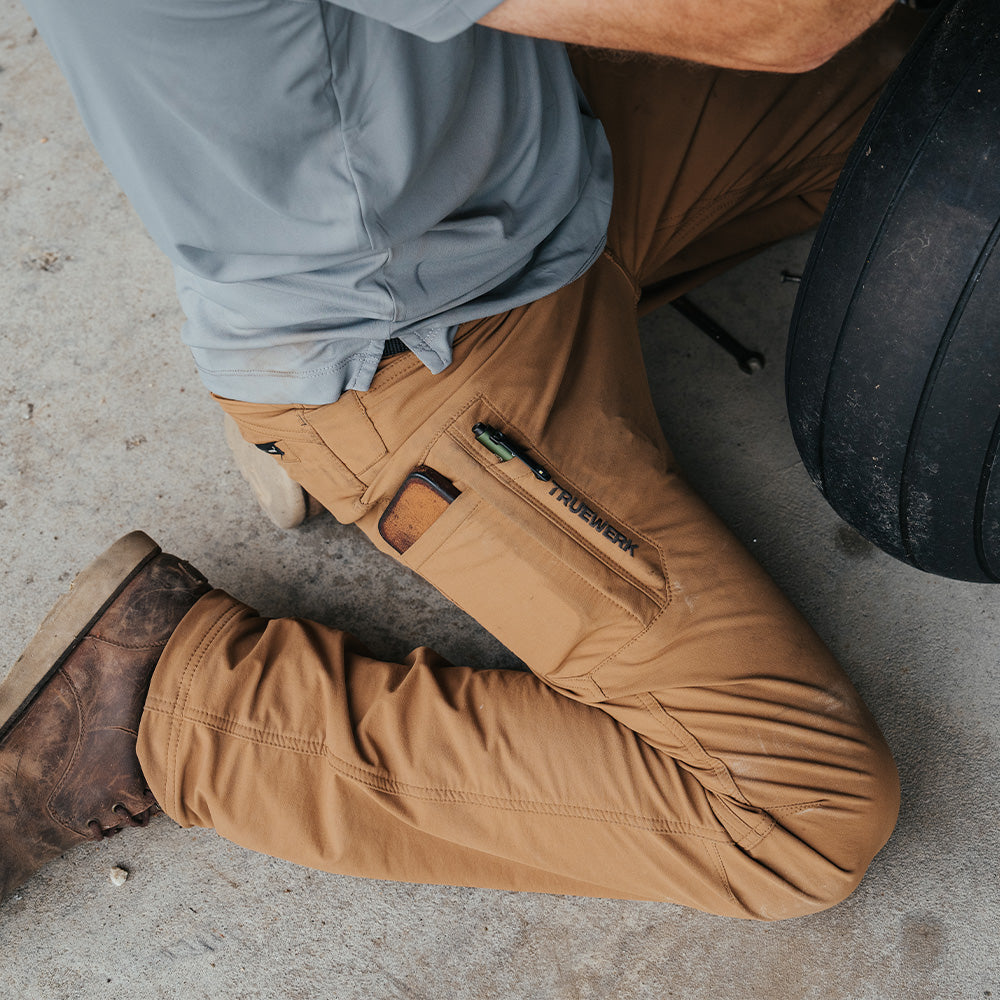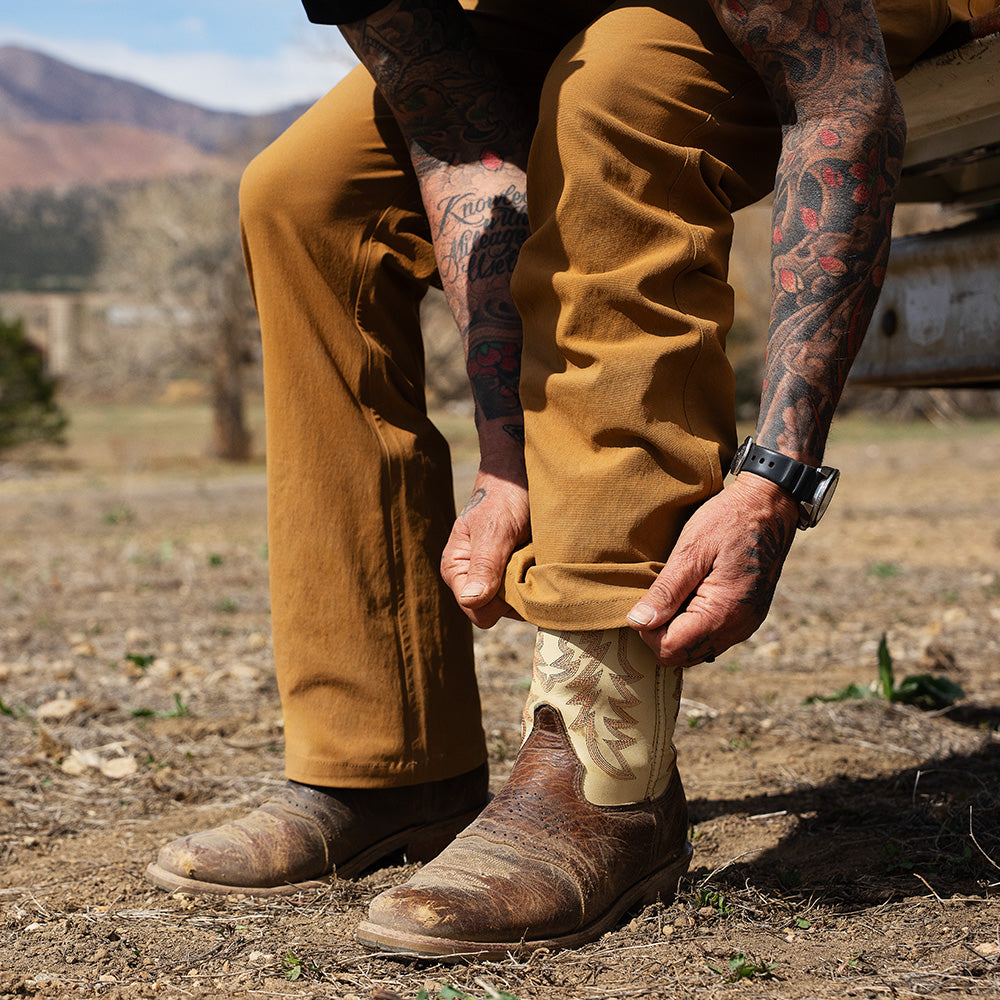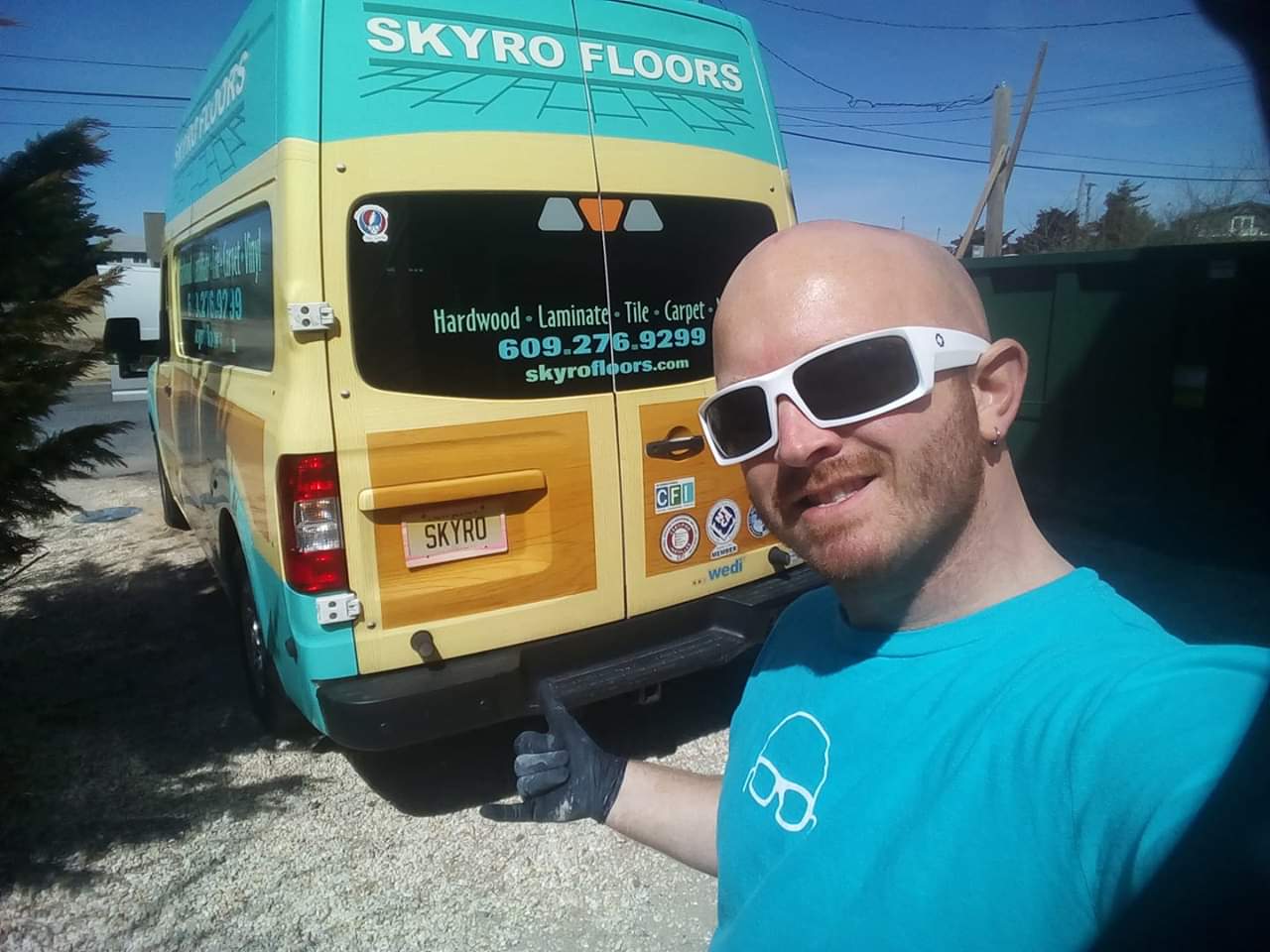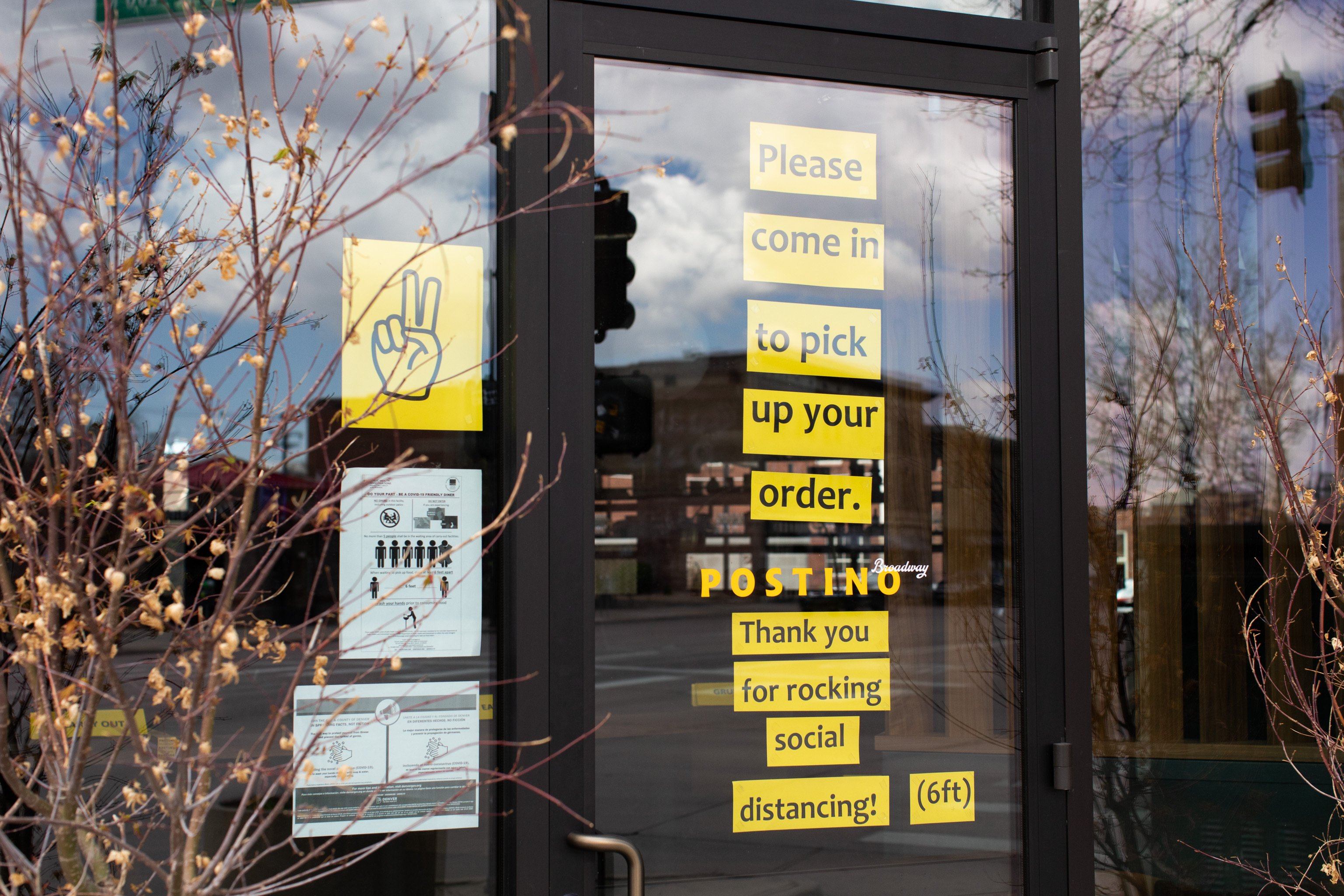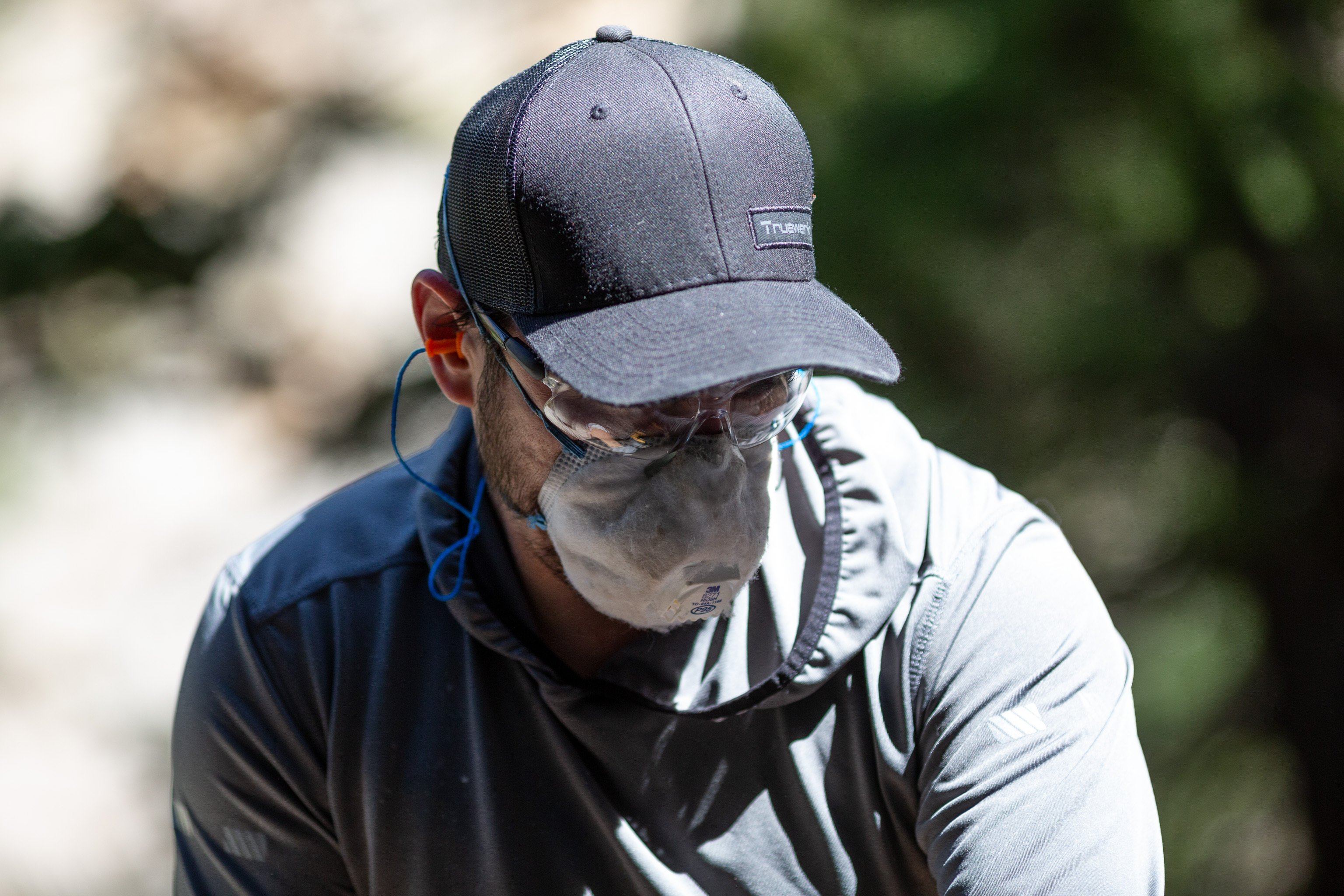In honor of what was supposed to be Small Business Week, we chatted virtually with Ken Ballin, trade professional and owner of Skyro Floors. His company is the perfect small business spotlight and a great example of the kinds of people who wear our workwear.
Ken spoke with us to share his insight on his business, talk about starting a business, and let us know what’s helped him find success in the trades. Check out the video (fair warning, the quality is a bit rough), or read the Q&A transcript below.
Part 1: Starting a Trade Business
Introduce yourself, Ken! When did you start your trade business?
I own Skyro Floors. I am in the Long Beach Island area of New Jersey. I specialize in custom tile and flooring. And I started my business in '08, at the end of the recession. I started out with a box store contract and have kind of evolved into a higher and more specific clientele.
So, first question for our small business spotlight. Tell us about starting a trade business of your own. What made you get into tiling?
When I first started my business, I only did laminate flooring and it was click together stuff—kind of simple. Nothing too complex. And then having that box store contract, they kind of came to me and said, “Well, can you do hardwood?” So, I learned how to do hardwood. I networked with a local installer or two and kind of got my feet into that. I learned the basics and I'm entirely self-taught. I didn't work for anybody else. I kind of figured it out as I went along. I just have this craving for knowledge. So, any sort of certifications or trainings I can get my hands on, I go nuts for.
Through the laminate and the hardwood, that contract got bigger. I was asked to take on more stores, I was also asked to take on tile work. I started with the really simple stuff and then I kind of evolved into the higher end market. With that, comes more technical installs such as shower installations where it's a little more complex than a floor. And it's a little more design based than just slapping in some tiles.
Did your family have a background in the trades? Do you have a small business spotlight of your own from your past? What was your journey like toward starting a trade business?
My grandfather was a carpenter and a Navy CB. I remember us as a kid building Pinewood Derbies and stuff like that in his basement with him. He really taught me everything I know about tools and that sort of application. I remember us doing everything like woodwork and stuff. I couldn't have been more than twelve or thirteen. He’d have me sweating with pipes under the house with no light. Anyway, I sort of learned through that sort of thing.
I actually went to school. I have my bachelor's from Monmouth University in business administration with a marketing concentration and an I.T. minor. That isn’t relevant anymore—l learned a lot of outdated information. I'm really big on the trades and, you know, not necessarily, having as much focus on college, if that's not what you want to do.
I think it's important though. There's a lot of guys and girls out there that start their own business because they're good with their hands, might be really good installers, but they just don't have that business mindset. So, I get questions all the time—DMs and everything—about how to start their own business. And I always say, go take a few business classes—Just because you can execute an install doesn't mean you have the knowledge to deal with people, to deal with the numbers side of things. There are many men in business, but not many businessmen.
For our small business spotlight, what would you tell someone starting a trade business to look out for? What are some mistakes you’ve made?
I see people interacting with each other in ways that they might not interact with each other if they were face to face. If you know what I'm getting at. And I think it's really important that we take that age-old lesson that all of our parents taught us "If you don't have something nice to say, don't say anything at all." Because how you act towards others and how you are perceived is part of that reputation that you develop.
If I am constantly negative and I have critical things to say about everybody, that's kind of what's going to come back to me. I'm a true believer in you get back what you put out into the universe. If I'm a positive influence, if I have nice things to say, constructive things to say—that's going to come back to me. I try to be compassionate and share the knowledge that I have. I always tell everybody I know I'm nothing special. I'm no more talented than anybody else. I just want to see all of us succeed. If I can help you succeed and I can give you whatever knowledge that I have that's worked for me, then I'm happy to do so.
One key reason we do small business spotlights is because it can be so challenging to get one started. What was the biggest hurdle when you were starting a trade business of your own?
I've been very lucky. I started my business at the start of the last recession. So, to start out on my own and already have that contract…at the time people in the trade had this stigma related to box stores. And, I do have a tendency to feed into that now and then. Without them though, I wouldn't be where I am today because I learned through seeing how things operate. What I liked, what I didn't like. I did really well with them for a long time.
And, I worked on my reputation. Finding work was never a struggle for me because it just showed up in my inbox day after day. We had to get everything done. And I had the crews. I had, in my time with them, 13 stores and maybe a dozen crews in all flooring categories. So, the work was coming in. It was just a matter of watching the other crews now as opposed to just having myself doing one install at a time. It was really as I went on, the struggle became more of monitoring others than monitoring myself because I developed that personal reputation of being the go-to guy to fix things. The one that was always taking the training and certifications. So, I had that knowledge, but it really became a worrying about-others-more-than-myself kind of challenge.
Part 2: Growth, Exposure, & Building Relationships After Successfully Starting a Trade Business
How did you get enough exposure to keep the business growing after you successfully started your trade business? For instance, we’re doing this small business spotlight interview. What are some other forms of exposure you got?
There’s so many things that come to mind. From starting on my very own, getting that first job, that first install, you just build that reputation. The first person that I did work for told their friends, then I worked for them and they told their friends. You start on such a small scale, but as long as you're doing things properly and you’re putting good things out, good things come back to you.
I wasn’t focused on marketing myself back then, I was more focused on work, work, work, work, work. Now, I've really kind of evolved into utilizing marketing again as a tool because I'm going after those higher end customers, those more particular projects that are a little more technical. There are people that know me based on the work that I've done, based on the work that I've put on social media. Social media is such a fantastic tool for small business owners because you can reach across the world in a means that we weren't able to before. A lot of my work comes from social now.
Our next small business spotlight question: What’s your advice for the first few years after starting a trade business, based on your own experience?
Just plug away and keep your standards up through each install. Every customer that I took care of went back and recommended me. Once the work started it just kept coming. And there was no stopping it.
There's been slow times. Sticking through those times and not knowing what was coming. It really pushes you to kind of find other facets of your business that are successful and do other things and branch out. It's really about how you deal with what you're given. How you play those cards that you're dealt. It's something that a lot of people maybe have a problem expressing properly, or they kind of struggle with what they're dealt. And, you know, sometimes people have a tendency to fall into the "why me?" mindset, where I've always been "OK, how do we move on from here?" And I think that's important.
One reason we picked you for this small business spotlight is your positive attitude. Moving on from starting a trade business: Once you’re out of the gate, how do you build solid relationships? Can you expand on the positive mentality you use?
If you're a homeowner and you're coming to me to do your work, it's because you want me. You don't want anyone else. I don't get too many random phone calls of people just trying to get estimates. It's typically a referral from somebody or somebody that's seen my work and wants the product that I'm offering. I think how I treat my customers and how I treat others goes a long way. I think that how I behave online and how I post plays into it.
I was talking to a few installers the other day who were having issues with posting online and using social media, paying for ads. And they said, "how do you get that customer base that you're dealing with right now?" My answer was that I honestly don't pay for ads on social media. I just participate. A lot of my business comes from local Facebook groups and I don't go online and push my business in these groups, but I respond to posts.
If somebody comes into a group and says, "I'm looking for a tile installer," I'll respond, "Hi and so-and-so. I'm Ken Ballin. I own Skyro Floors. I am a certified tile installers certified floor covering installer. You can see some of my work on Facebook, Instagram, LinkedIn," and I don't even leave my contact info. I just put my social's up. That’s it. Put a few pictures of projects that I've been working on recently and I'm always happy to answer any questions.
If anybody is looking for any trades that I don't take care of, I will recommend the people that I use. My plumber or my electrician, my fence guy. And by promoting other small businesses, you develop these relationships. These are my friends that I know do good work because they work on my house. So, I'm happy to recommend them to my customers because every good referral is a good referral to not only them, but for you as well.
Part 3: Social Media, Networking, & Branding
So, we’re moving on in our small business spotlight past the point of starting a trade business. Now we’re talking about building on your success. Tell us more about your social media presence and what you do to be active in communities.
We have an online community that, through Facebook groups, are for the flooring industry and the tile industry. I help moderate ads in these groups. We have people across the industry, across the world, in these groups from all different levels. From the apprentice all the way up to CEOs of manufacturers. We have the most experienced installers that I've met. We kind of come together, build each other up, share our projects, ask each other questions.
If I get stuck on a job and I have and I don't know what to do, I can post on one of these groups and get an answer back in 10 minutes, less than that even usually because somebody is always on. There's always somebody somewhere that's on the grid. They're oddly addicting, but we kind of love it.
Do others have groups like this? Is there another networking group like this that would make for a good small business spotlight? Is this kind of resource essential for starting a trade business and succeeding in it?
I know that there are like there are a group of painters and plumbers and I don't know that they have the dynamic that we do. I think there's something special about tile centers and floor layers where we've become like a family. We have those members that argue and fight and go back and forth on each other. But at the end of the day, they're still part of the family. Still bring value. We really have this entity that has just become bigger than us and the good that we do. It's really impressive. From charity projects to this installer got their truck broken into and we have manufacturers sending them tools like it's really something special. We call in favors whenever we can.
Part 4: Challenges in Your Business & Advice for People Who Want to Start a Trade Business
Now that you’re past the point of starting a business from scratch and getting it up to speed, where is the new challenge? When you wake up in the morning, what gets you excited about what you do?
I like being able to put out a product that families have used for years to come. I always tell everybody, the work that we do, families live their lives on and they experience their highs and their lows and they have their holidays—everything, really—on what we've done to their houses. And, that's big. That's something. There's not a lot of things out there that see families through their lives. But our work really does, whether it's a floor or it's their bathroom or something. We've created this space for them. It brings out warmth.
After starting a trade business and working in it for so many years, are there any small business spotlight projects you’ve done that stand out as some of your favorites? Or most challenging?
The challenging ones may not stick out in my mind for a good reason.
I have a project actually that I haven't done yet, but is coming up. It’s for a local family. I coached their daughter in soccer with my kids back when they were young. She has since developed an illness where she's no longer mobile. So, she's in a wheelchair and having difficulty living around the house, in the bathroom and everything like that. I reached out to my manufacturer friends throughout the industry and managed to get flooring for their house donated, tile and bathroom and setting materials—all donated. We're about to jump into this shortly and get it executed. That's going to be a big one. Guys are donating labor to help out to get it done. Stuff like that is always what stands out in my mind. The things that might not be the highest paying job but have the most impact.
Let’s use our small business spotlight to help others following a similar path as you. What’s the biggest mistake a newcomer to the trades can make when they’re starting a trade business of their own?
I would have to say saying yes to everything. The hardest lesson that I've ever had to learn as a business owner was when to say no—when to say, "No, I can't do that job for less money because this is what it costs to run my business" or "No, I can't do this install because you're not allowing me to install this up to spec how it should be installed." There’s a lot of pressure also from both sides, when to say yes, when to say no. Learning when to say no goes a long way.
I’ve never lost money on a job I didn’t do.
Part 5: More About Successful Branding After Starting a Trade Business
Any tips for building brand awareness? Should a small business spotlight its brand above and beyond the services it offers?
Aside from social media, I think brand awareness goes back to your brand reputation. A brand is who you are. It's what others think of you before seeing you. So I always say: Build your brand, focus on building your brand.
That doesn't necessarily mean your business. It means you as a person. Your brand is who you are. And you need to focus on that person that you want to be. If you are a positive influence and if you have good things that you're doing, people are going to notice. People are going to take that into consideration when hiring you. And, they're going to be more apt to talk to other people about it. It’s really important that you're on your best behavior. Like mom and dad always said, “When you slip, when you have that one job that went wrong, people know a happy customer will tell a friend about you, but unhappy customer will tell 10.”
What’s with the sunglasses that are the symbol/logo for Skyro Floors? Is this a small business idea that came to you when you first started your trade business?
Honestly, when I started my company, I was in a black Silverado and it had a white reflective lettering across it. And it was just Skyro Floors for us. This big, blocky font with two bars over it. That was it. And then I kind of got bored with it and I was like, "I've got to do something with this." I kind of added like wood planks coming down from the bottom part. And then that became the logo.
Through doing this, I kind of locked myself into people only thinking I do one sort of flooring and not calling me for others. So, it was kind of an unconscious thing that I had to myself. Then, I said well, I'm doing a lot of tile now. I want to do something with the logo. I was toying with the idea of doing, like, herringbone going up the top and keeping wood on the bottom. I was like, well, what am I going to do? Add something to this logo every time I want to do something else?
And I just happened to be walking through the bathroom or something and I glanced in the mirror at my sunglasses. I always wore my sunglasses on my head. They fell down in front of my eyes. And I was like, that's it. That's what I got to do. I'm not building the Skyro Floors brand.
I want to build my brand. Me, I make it about me. I went to a friend of mine who does graphics and stuff like that, told her what I wanted to do. I actually sent her a picture of my sunglasses. I was like, "listen, this is all we got to do." She said "I love it. I'll put it together for you." That became the logo. It’s kind of it's just become this crazy thing that everybody recognizes now. I was down at a flooring convention in Florida with CFI. I pulled up and I hadn't met a lot of these people in person before. I came out and I met the people, and a bunch of them had white sunglasses that they brought, you know, just joking. But they all put it on. When I walked up and I thought, that's it. The reputation has preceded myself.
Part 6: Final Thoughts
Anything else you want to share for our small business spotlight—about starting a trade business, building your brand, or anything else?
I am a certified tile installer, so I really want to express the importance of consumers utilizing qualified laborers. We spend too much time ripping out projects that shouldn't have gotten by—installers that may not have been doing anything that they even knew was wrong, but something that ended up costing customers in the end.
Through organizations like Ceramic Tile Foundation and CFI, we really have a chance to do a lot of good for installers, especially those that are just starting out. They ought to know, people are hungry for knowledge and we have that. But getting the word out there that these organizations exist can be a task at times. So, what we want to do is take these organizations and put them on the forefront of social media and on all of our social fields everywhere that this is something that's out there. This is something that's available and it's something that can do a lot of good, because what we want to do at the end of the day is transform the trade and make it a more acceptable thing than it may have been in the past, because there are a lot of people out there that, like I said, don't know that we have this information. They don't know that they can have access to all of these people across the world with all these fantastic ideas. And it's important that we step up our game and we're putting out good work and we're looking out for our customers the best we can.
